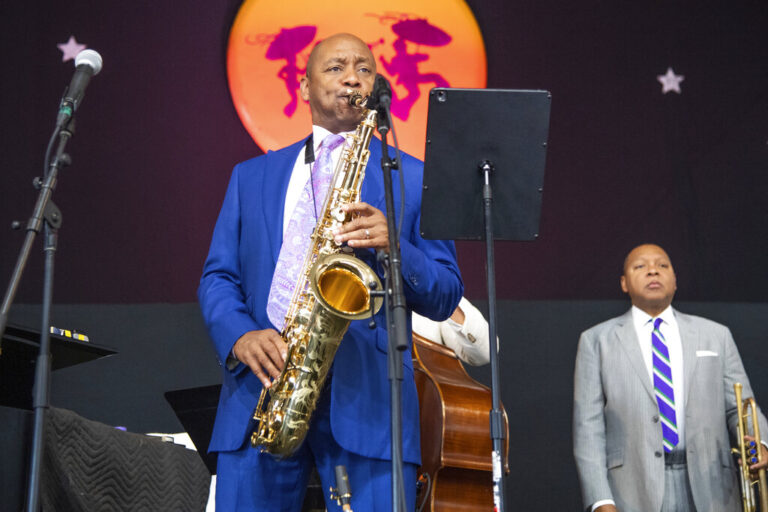URBANA – The Branford Marsalis Quartet is coming to Krannert Center for the Performing Arts on Saturday, January 27 at 7:30 p.m. Morning Edition host Kimberly Schofield spoke with Branford Marsalis, the Grammy award-winning saxophonist, about coming into own as a renowned performer.
While he’s best known in the jazz scene for leading the Branford Marsalis Quartet, his musical skills aren’t limited to just that genre. He’s also taken the stage with classical groups and was at the helm of a band called Buckshot LeFonque. You might also remember him from his stint as the band leader for “The Tonight Show” when Jay Leno took over in 1992. He was with the Tonight Show Band until 1995.
Kimberly Schofield: Branford, thank you so much for joining me. You came from a family of musicians. Did you always know that you wanted to be a musician or was there ever a pivotal moment that kicked you into gear?
Branford Marsalis: I always knew I wanted to play music. But I never thought that I’d become a professional musician. That was mostly Wynton who fervently believed he was going to go to New York and shock the world. And he pretty much did. Yeah, I’m a year older than him. So when I graduated from high school, I went to a historically black college in Louisiana, Southern University, and I marched in the band, and I was studying to become a history teacher. And I was just going to teach history and play with a wedding band on the weekends because I loved playing. But I didn’t have any aspirations to leave the state. When Wynton got to New York, he just constantly bothered me with “Man you need to be up here. You don’t need to be down there. You know, you can learn how to play jazz easy, you got great gifts, blah, blah, blah,” and I really wasn’t interested. And my dad says to me, “You know, I’m not gonna tell you what you should do,” he says, “but what I will tell you is that you don’t want to be in your 30s with a couple of kids sitting around wondering if you could have done it.” Yeah. So when he said that I came up with a plan. I said, “Great. I’ll go to the Berklee College of Music first -because it’s in Boston, it’s not as expensive as New York- save some money and go visit Wynton in New York and do these things.”
KS: You’ve done a lot of different things. You’ve composed for movies, you’ve hosted shows, and of course, you are a renowned saxophonist. Do you have a preference?
BM: I’m a player. I have this thing…my dad used to have this saying, “The thing you do most is the thing you do best. I just wrote this piece…this suite for the Kalamazoo symphony. 20 minutes for orchestra. And then people say, “Well, now you’re a composer.” And I say, Well, no. I’ve written a composition but I’m not a composer.” And then they say, “Well, what’s the difference?” It’s that composers compose. Composers don’t do TV shows, play with pop stars and work with Public Enemy and play with a band and go into…they just compose. And I know we’re in this era where everything is kind of hybridized. Musicians always call themselves “musician slash composer.” It kind of it cheapens the title. If you write 16-bar songs, you’re not a composer, you’re a songwriter. But composer sounds more noble than songwriter. So we go with composer. We’re in this thing where the optics matter more than everything else. And for me, listening to as much classical music as I have, and having as much love and respect for composers that I have, it’s not a place that I can go.
KS: With your whole family being musical…when you all went on tour together, were there any challenges or did you all just have one big happy family flow together?
BM: We’re all just a bunch of jackasses. So it really was fun. My dad was brilliant with this. When Wynton started playing the trumpet, I was playing piano and I hated playing the piano. So when Wynton joined the school band, I said, “Well if I join the school band, it’ll get me off this damn piano, so I’ll do anything.” So he said, “What instrument do you want to play?” I said, “Trumpet.” And then he said, “No,” leave it to my dad….”No. Einstein says that the same matter can’t occupy the same spaces at the same time or chaos ensues.” I’m like f*****g seven. Like, What? What? “No, you can’t play the trumpet. You have to pick another instrument.” “How about clarinet.” “Okay.” So I played the clarinet. And then when I was 14 years old, I started noticing girls are really beautiful creatures, and I should pursue them. So I saw these three pretty girls and I followed them into a dance, and I was too terrified to meet them. So I said, “I get it. If I join one of these bands, I’ll meet girls.” So I went home and said, “I want an alto saxophone.” So at Christmas, I got an alto saxophone. As soon as I got the saxophone, I hired a much better keyboard player to join the band and I played saxophone. And in all of that, what I learned was that the girls are attracted to the singers and the guitar players and I still never got the girls. But still, now we’re stuck with this f*****g saxophone, and I might as well just play it. So many, many years later – back to your question – yes, we’re on tour and it’s still pretty much like that. We don’t play the same instruments so there’s no competition. Wynton plays trumpet, I play saxophone, Delfeayo plays trombone, Jason plays drums and vibes. Old man played piano. We just had a good time.
KS: What do you think about jazz, currently, in the 21st century? What does it look like to you?
 BM: The same as everything else: the optics matter. Everybody’s a jazz musician. Now, you know, guys are playing in R&B bands talking about their jazz bona fides. Again, it’s not really pejorative to me, you know, some guys get upset about it. I mean, I don’t get upset about it, but I see it and I observe it. You know, the word jazz…the MacArthur Genius grants…in the jazz award, they give the awards to the people who they think are moving jazz farther. And the one thing that they all have in common is that they are woefully not adept at playing traditional jazz. So jazz needs to move to a place where it no longer recognizes itself. And then other people can get awards for preserving that. So the jazz award always bends towards people who have a certain kind of mathematical understanding of the music. It’s almost like a sin to play traditional music. None of this upsets me. I don’t care because the general level of music and musical incompetence out here when it comes to jazz has allowed our band to work a lot. Usually, at my age, we don’t work as much.
BM: The same as everything else: the optics matter. Everybody’s a jazz musician. Now, you know, guys are playing in R&B bands talking about their jazz bona fides. Again, it’s not really pejorative to me, you know, some guys get upset about it. I mean, I don’t get upset about it, but I see it and I observe it. You know, the word jazz…the MacArthur Genius grants…in the jazz award, they give the awards to the people who they think are moving jazz farther. And the one thing that they all have in common is that they are woefully not adept at playing traditional jazz. So jazz needs to move to a place where it no longer recognizes itself. And then other people can get awards for preserving that. So the jazz award always bends towards people who have a certain kind of mathematical understanding of the music. It’s almost like a sin to play traditional music. None of this upsets me. I don’t care because the general level of music and musical incompetence out here when it comes to jazz has allowed our band to work a lot. Usually, at my age, we don’t work as much.
You look at jazz, in the 40s and the 50s. The guys who were lauded in the 80s…in their 60s or 70s…had a drop off in the middle because new young guys came up and they were pushed aside for the up-and-coming players. These young guys, they’re all great players. This is probably the best generation of players ever. It’s incredible how well they play the instrument. They just don’t play the music very well. And that’s because they never really tried to check it out. And the language of jazz is not harmony, the language of jazz is jazz. And there are some young people in New York that I’ve met now who are starting to understand that the language of jazz is actually jazz.
KS: What can we expect then when you come to Krannert? Is everyone going to play for the people when you come to Krannert here in Urbana?
BM: You think about how a lot of modern jazz players look when they play…you know, it’s kind of boring to look at them. They’re really introverted. You know, they all wear like black T-shirts and black pants, and you know, it’s just, they’re all soft spoken. But we’re the opposite of that. We wear sharp suits, and we are truly – I don’t know if there’s gonna be a whole band for that gig…I hope so – we’re just four jackasses. We tease each other incessantly on stage, we laugh a lot. We enjoy what we’re doing. So even if you’re not the biggest jazz fan in the world, we might play a complicated song, but we always follow up with a song with that has a melody that’s easy to follow, because we like jazz. We don’t think of jazz as a vehicle to like, highlight our own genius. We just like playing. We’re players. And we play fast songs and slow songs and pretty songs and ugly songs and hard tunes and easy tunes. It’s great to be in a band with that kind of musical versatility.
Krannert Center for the Performing Arts is an underwriter of Illinois Public Media.

